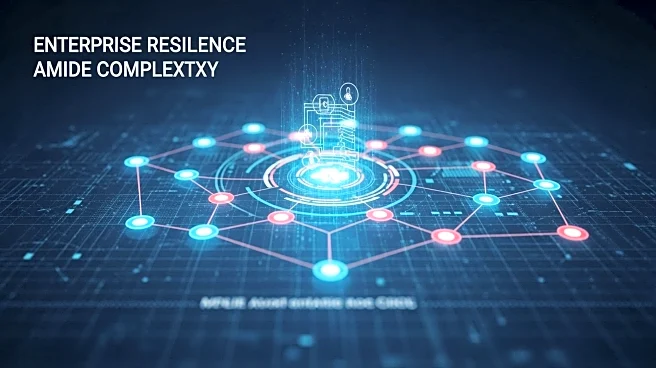What's Happening?
At the Tanium Connections event in Sydney, Erik Gaston, Tanium's Vice President of Global Executive Engagement, addressed the evolving nature of enterprise resilience. Gaston emphasized that traditional
IT models are struggling under increasing complexity as businesses expand through cloud, AI, and distributed work environments. He argued that resilience now requires predicting and preventing disruptions rather than merely recovering from them. Gaston highlighted the importance of automation, autonomy, and real-time insights in managing the vast amounts of data generated by modern enterprises. He noted that slow response times and poor throughput can damage business outcomes, making speed and certainty the new measures of resilience. Gaston also pointed out that while generative AI investment is rising, many organizations are not prepared to adopt it safely, posing a challenge for CISOs who must balance innovation with security.
Why It's Important?
The insights shared by Erik Gaston are crucial for U.S. businesses navigating the complexities of modern IT environments. As companies increasingly rely on cloud and AI technologies, the ability to predict and prevent disruptions becomes vital for maintaining competitive advantage. The emphasis on speed and real-time data underscores the need for businesses to adapt quickly to changing conditions, which can impact their operational efficiency and market credibility. Organizations that fail to integrate automation and real-time insights risk falling behind in innovation and may face increased security vulnerabilities. This shift in resilience strategy has significant implications for U.S. industries, particularly in sectors like technology and finance, where rapid adaptation to new technologies is essential.
What's Next?
Organizations are likely to focus on enhancing their IT strategies by integrating automation and real-time data solutions to improve resilience. This may involve investing in platforms that offer seamless communication between workflows and adopting AI technologies that can autonomously manage risks and improve operational efficiency. As businesses strive to balance innovation with security, CISOs will play a critical role in ensuring safe adoption of AI and other emerging technologies. The push for real-time visibility and speed may also lead to increased collaboration between IT and security teams to break down silos and improve overall enterprise resilience.
Beyond the Headlines
The shift towards proactive resilience and real-time data management may lead to broader cultural changes within organizations. As businesses prioritize speed and certainty, there may be a greater emphasis on continuous learning and adaptation, fostering a culture of innovation and agility. Additionally, the focus on breaking down silos between IT and security could lead to more integrated approaches to cybersecurity, enhancing overall organizational trust and collaboration.









